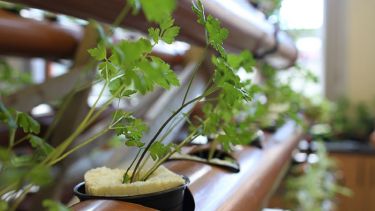A new research project, funded by the Biotechnology and Biological Sciences Research Council (BBSRC), is set to explore how plants respond to rising CO2 levels on a molecular level that will lead to more sustainable farming practices and the development of climate-resilient crops.
The £1.3million project, led by Dr Stuart Casson, will focus on understanding the fundamental cellular and genetic mechanisms that allow plants to sense and adapt to their environment - specifically CO2 levels.
The team, including scientists from the University of Bath and the University of Bristol, will be focusing on a previously unexplored area of plant biology, examining how all different plant cells and genes - not just the surface pores known as stomata - respond to changes in CO2 levels.
While higher CO2 can boost photosynthesis, it often has a hidden cost, making it harder for plants to absorb water, absorb vital nutrients and cool their leaves during warmer weather. This trade-off can reduce crop yields and make them less resilient to climate change.
Surprisingly, we don't know if all cells within a leaf have the same capacity to respond to CO2. Such fundamental knowledge is crucial if we are to generate more resilient crops given the ongoing increases in global CO2 levels. Our groundbreaking project, which was awarded a grant from the BBSRC, aims to answer this question. We have already identified the first example of a long non-coding RNA that regulates plant responses to CO2, and we are delighted to be working with our collaborators at the Universities of Bath and Bristol.
Dr Stuart Casson
This research builds on the team's earlier discovery of a molecule called a long non-coding RNA (lncRNA) that seems to control how stomata respond to CO2. However, the molecule, named Regulator of Stomatal CO2 sensitivity (LRSC1), is unlike regular genes that create proteins - LRSC1 uniquely acts as a regulator able to turn other genes on or off.
By understanding how this regulator works scientists aim to pave the way for more sustainable farming practices in the UK and globally and ultimately ensure that food production can adapt and improve - even in the face of our planet's changing climate.

